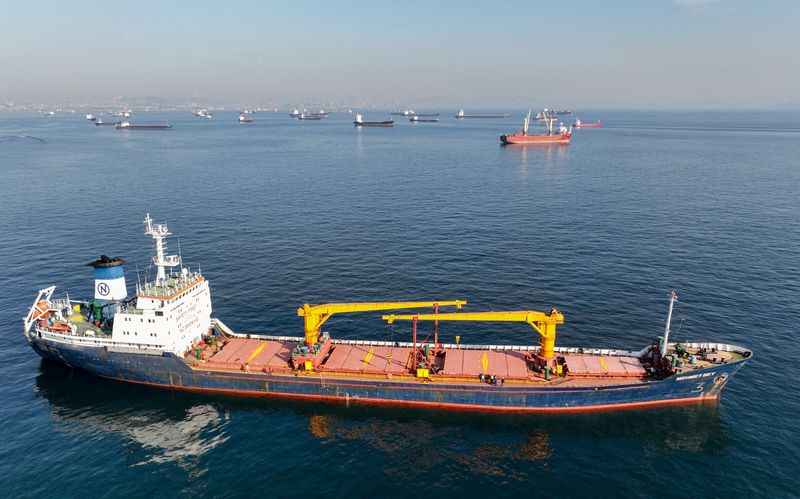By Michelle Nichols
UNITED NATIONS (Reuters) -If Russia does not agree to extend a deal allowing the safe export of grain and fertilizer from Ukrainian ports, it is unlikely Western states will continue cooperating with U.N. officials helping Moscow with its exports, the United Nations aid chief said on Friday.
Russia has threatened to quit the deal, which expires on July 17, because several demands to dispatch its own grain and fertilizer have not been met. The last three ships traveling under the deal are loading cargoes at the Ukrainian port of Odesa and are likely to depart on Monday.
“The world has seen the value of the Black Sea Initiative … this isn’t something you chuck away,” the U.N.’s Martin Griffiths told reporters.
The United Nations and Turkey brokered the Black Sea Grain Initiative with Russia and Ukraine in July 2022 to help tackle a global food crisis worsened by Moscow’s invasion of its neighbor and blockade of Ukrainian Black Sea ports.
Ukrainian President Volodymyr Zelenskiy discussed the deal with Turkish President Tayyip Erdogan in Istanbul on Friday.
“We are working on how long we can extend (the deal) after July 17. Our hope is that, it will be extended at least once every three months, not every two months. We will make an effort in this regard and try to increase the duration of it to two years,” Erdogan said in a joint news conference with Zelenskiy.
Zelenskiy said the Black Sea deal was important to help the world fight hunger.
“It is crucial that we take action in such a way that the life of the grain corridor, and therefore the lives of other people, does not depend on the mood with which the President of the Russian Federation wakes up,” Zelenskiy said.
More than 32 million tonnes of corn, wheat and other grains have been exported by Ukraine under the arrangement. Russia has complained that not enough reaches poor countries, but the United Nations argues that it has benefited those states by helping lower food prices more than 20% globally.
Griffiths is the lead U.N. official on the Ukraine Black Sea deal, while senior U.N. trade official Rebeca Grynspan is working to ease Russia’s food and fertilizer exports.
Grynspan hopes to travel to Moscow before July 17 and Griffiths hopes to meet with the parties next week in Istanbul, where a joint coordination center of Russian, Ukrainian, Turkish and U.N. officials implements the Black Sea deal.
AMMONIA PIPELINE DAMAGE
Grynspan has been working with the United States, European Union, Britain and others to smooth Russian exports. Russia has described the Black Sea deal and the agreement to facilitate its own exports as a single package.
“A single package works both ways,” said Griffiths, suggesting that any Western cooperation with U.N. officials on Russian exports might evaporate if the Black Sea deal was not extended by Moscow.
To convince Russia to agree to the Black Sea deal, a three-year memorandum of understanding was struck at the same time under which U.N. officials agreed to help Russia with its food and fertilizer exports.
While Russian exports of food and fertilizer are not subject to Western sanctions imposed after the February 2022 invasion of Ukraine, Moscow says restrictions on payments, logistics and insurance have amounted to a barrier to shipments.
Russia’s demands include resuming Black Sea ammonia exports and reconnecting the Russian Agricultural Bank to the SWIFT payment system. The Black Sea deal allows for ammonia exports – a key ingredient in nitrate fertilizer – but none has shipped.
A pipeline, which once pumped up to 2.5 million tonnes of ammonia annually for global export to Ukraine’s Pivdennyi port on the Black Sea from Togliatti in western Russia, has lain idle since the start of the war.
Last month it was damaged in three places, Griffiths said, adding that the U.N. had offered to send in a team to assess it. He said both sides were interested, but a team had not yet been deployed because the pipeline damage was in an active war zone.
He said if it could be repaired then an arrangement would be needed to protect it from the war. According to the International Energy Agency, it is the world’s longest ammonia pipeline at about 2,470 kilometres (1,534 miles).
“So there’s lots of impediments to making that a realistic prospect immediately,” Griffiths said.
As the expiration date looms, the Black Sea grain deal is grinding to a halt.
No new ships have been registered to travel to Ukraine since June 26. Under the deal, Russia, Ukraine and Turkey approved the ships to travel and all vessels are inspected by a joint team of Russian, Ukrainian, Turkish and U.N. officials.
(Reporting by Michelle Nichols; Additional reporting by Can Sezer in Istanbul and Elaine Monaghan in Washington and Oleksandr Kozhukhar in Kyiv; Editing by Doina Chiacu and Grant McCool)
